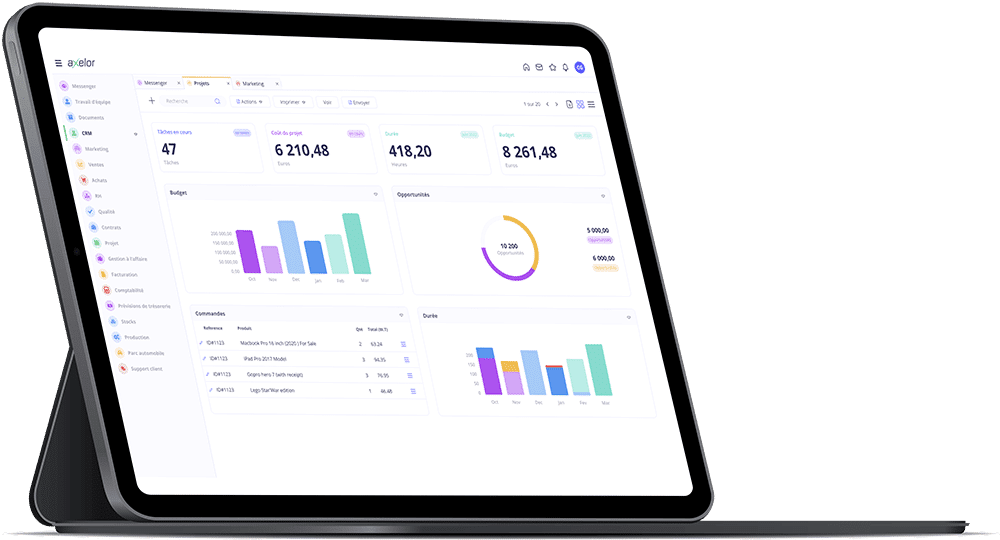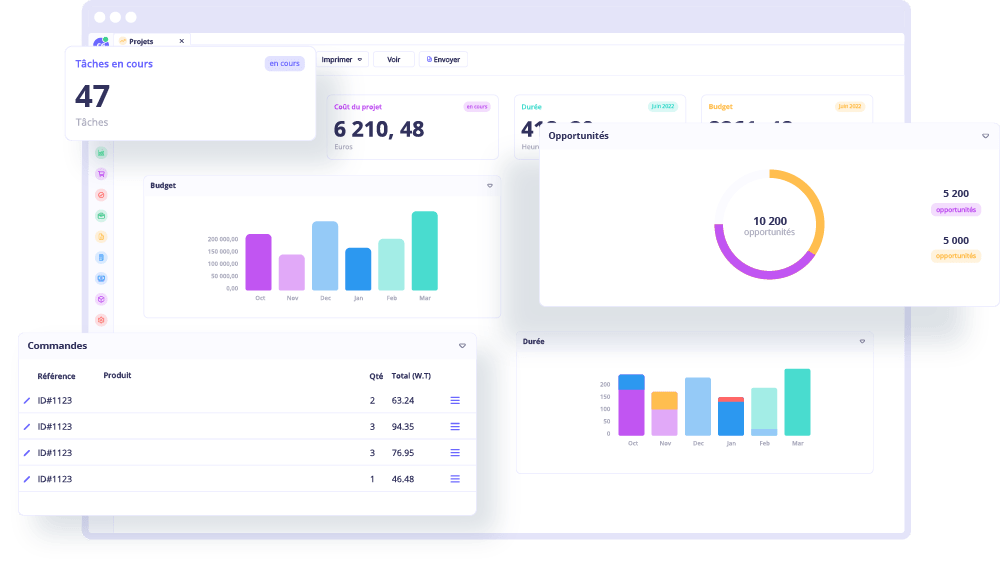ERP
Which ERP to Choose for Your SME? 9 Essential Criteria to Make the Right Choice
Choosing the right ERP software can have a significant impact on your organization’s operational efficiency, productivity and profitability, as well as on your customers’ satisfaction!
Not sure which software publisher to choose from the many solutions available on the market? We’ll help you make the right choice taking into account every essential criterion in the selection process.
Contents
Organization type: an essential basis for ERP selectioneast
Functional coverage and ERP system agilityeast
User experience and adoption of an ERP solution within your SME/SMIeast
Short-, medium- and long-term ERP costseast
Identifying your real needs and the essential functions of your ERP to manage your business
When it comes to selecting the right ERP software, it's essential to consider your specific needs and the functions that are essential for managing your business.
Before starting your search, the first step is to analyze your existing business processes. With a full understanding of your business processes, you’ll be able to identify areas where automation or workflow improvements are needed.
This will enable you to examine current process inefficiencies to determine the key functionalities you need to optimize your operations.
It will also be vital to involve all the stakeholders in your organization in the selection process, as everyone will have unique requirements when it comes to ERP. Their point of view will make it easier for you to identify the real needs.
Once you’ve identified your company’s specific needs, draw up a list of features that you consider essential for your ERP software. Rank them according to their importance and relevance to your organization. It’s important to focus on those that will have a direct impact on your business objectives, and that address the critical needs of your business.
When selecting an ERP, it’s important to think ahead and anticipate your organization’s growth. To do this, make sure the tool can grow with you by choosing modular, scalable solutions that can be adapted as your needs change and your business grows.
Finally, check that the ERP is compatible with your existing applications. Good integration promotes the smooth exchange of information and avoids duplication of data.
Organization type: an essential basis for ERP selection
Every company has its own specific characteristics, needs and objectives, and these must be taken into account when selecting the right ERP.
Company size
Some solutions are specifically designed for small and medium-sized enterprises (SMEs), while others are more suited to large groups. It's important to choose an ERP that can handle your company's volume of activity without compromising performance.
Business sector
Some ERP softwares are designed for specific industries, such as manufacturing, distribution, financial services, healthcare and so on. It's essential to select a tool that understands the particularities of your industry and can support your specific business processes.
Complex operations
Some companies have complex business processes with sophisticated workflows and specific requirements. Make sure the ERP software you choose is capable of handling the complexity of your operations.
Geographical location
If your organization operates in several countries or has subsidiaries abroad, it's important to choose an ERP capable of offering multi-site, multi-language and multi-currency management features, which will make it easier to manage your international operations. You should also ensure that the tool is adapted to the legal, tax, and regulatory specificities of the countries in which you operate.
Functional coverage and ERP system agility
The functional coverage and agility of the ERP system you choose are two criteria that play a key role in your company's ability to adapt to change.
The functional coverage and agility of the ERP system you choose are two criteria that play a key role in your company’s ability to adapt to change.
Functional coverage refers to the scope of functionality offered by the ERP. Analyze in detail the modules offered by the tool to make sure they cover the main aspects of your structure. Adequate functional coverage will enable you to effectively manage all facets of your organization from a single, integrated platform.
ERP agility is crucial, as your company needs to be able to adapt quickly to new challenges, regulatory changes, customer demands and so on. Choose a scalable, modular ERP that will enable you to evolve your solution in line with your changing needs, and adapt to new market requirements.
The functional coverage and agility of the ERP system will enable you to optimize your operational efficiency, foster innovation, and remain competitive in the marketplace.

User experience and adoption of an ERP solution within your SME/SMI

An intuitive, user-friendly interface is essential to facilitate the adoption of ERP by your teams. Your staff must be able to carry out their daily tasks without difficulty. In fact, a well-designed interface reduces the learning curve and increases user efficiency, contributing to better overall productivity.
Make sure that the ERP vendor provides adequate training for your employees when integrating the solution. Effective training enables your teams to understand how to use the tool optimally and exploit all its resources. Quality support is also essential to resolve problems and answer questions.
Every SME has specific business processes and unique needs. It is therefore essential to choose ERP software that offers a degree of customization flexibility. This allows you to adapt the system to the specific requirements of your business sector, ensuring a smoother experience. An ERP solution that can be configured to meet the specific needs of your SME/SMI improves the efficiency and satisfaction of your teams.
Short, medium, and long-term ERP costs
When it comes to choosing an ERP solution, it's essential to consider the costs associated with implementing and using the solution. Here are a few expenses to take into account, which will enable you to anticipate your costs over the short, medium and long term:

It’s equally important to consider the cost savings that ERP can bring to your business. For example, automating your processes reduces manual tasks and the risk of errors. This leads to greater productivity.
An overall assessment of the costs and benefits of ERP will enable you to make an informed decision about your implementation project, and select a solution that best fits your budget.
The longevity and quality of support offered by the chosen ERP solution

ERP software is constantly evolving to adapt to new technologies and market changes. It’s essential to choose an ERP solution that offers regular updates and genuine functional upgrades. This ensures that your organization remains at the cutting edge of technology, benefiting from the latest enhancements.
The support offered by the ERP supplier is crucial to a successful implementation and optimal use of the solution. Make sure the supplier offers responsive and competent technical support to resolve problems and answer your employees’ questions.
You can check whether the vendor offers training services, online resources, and a community to encourage continuous learning and the exchange of experience.
The flexibility of your ERP for SMEs
Make sure your ERP software offers sufficient flexibility to meet your company’s evolving needs.
Flexibility means that your ERP can integrate seamlessly with existing systems.
To keep pace with your growth, it’s also vital that the ERP system offers sufficient scalability and extensibility to handle an increase in the number of users or data volume.
A modular ERP allows you to start with the essential functionalities, and gradually add new ones as your needs evolve.

Should you choose a Cloud ERP or an On Premise ERP?
Cloud ERP
Cloud ERP is hosted on remote servers accessible via the Internet.
By opting for Cloud ERP, you can access your data and ERP system from anywhere, at any time, as long as you have an Internet connection. This offers great flexibility for companies with employees working remotely or across multiple sites.
Cloud ERP software operates on a subscription-based payment model, reducing up-front hardware and software investment costs. You don't need to buy and manage your own infrastructure, which can be advantageous for SMEs with limited resources.
Cloud ERP providers are responsible for regular updates and system maintenance. This frees you from the workload of managing software updates, and allows you to benefit from the latest news and enhancements without hassle.
On Premise ERP
On Premise ERP is installed and managed locally on your organization's servers.
With On Premise ERP, you have total control over your data, which can be important for regulated industries or sectors with specific security requirements.
On Premise ERP requires greater initial investment, particularly in hardware infrastructure. You are responsible for managing maintenance, updates, and regular backups of the system, which incurs costs and requires dedicated in-house resources to manage these technical aspects.
When choosing between Cloud ERP and On Premise ERP, it's essential to consider the specifics of your field, such as your needs in terms of mobility, control of your data, budget, and IT resources.
Your company's field of activity
The final criterion to consider is that each business area has specific processes and needs. ERP software designed to meet your industry’s requirements can offer functional advantages that make it easier to manage industry-specific operations.
For example, an ERP for manufacturing may include functionalities such as inventory management, production planning, and quality control, while an ERP for healthcare may focus on managing electronic medical records and regulatory compliance.
Certain sectors, such as finance, healthcare, or utilities, are also subject to strict regulations on data security, confidentiality and compliance. An ERP specifically designed for your sector will offer enhanced security measures and reporting capabilities to help you comply with these regulations.
An ERP tailored to your industry is often backed by vendors who have in-depth knowledge of your business and understand its specific needs. They can offer specialized technical support and expertise to help you implement and manage your ERP effectively.
Ready to choose the best ERP for your SME?
With the help of this information and an analysis of each criterion, maximize the benefits of dematerialization and ensure that your company makes the right choice when it comes to your ERP software implementation project.
With the Axelor platform, you benefit from an ERP including a CRM. In fact, the solution includes an Open Source CRM that integrates natively with all other modules.
Powerful, scalable, and easy to customize, Axelor’s Open Source ERP includes over thirty integrated business applications (sales management, HR, inventory management, production, project management, accounting, invoicing, etc.).
Find out everything you need to know for a successful ERP specification with our white paper “The 6 key steps to make your ERP changeover a success”.
Find out how our ERP can help you improve your company’s performance
An expert will contact you shortly to discuss your project.